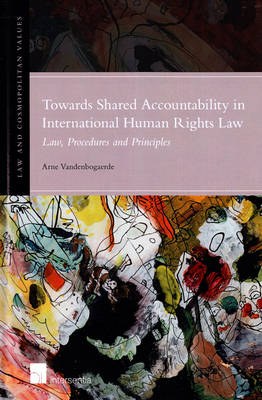
- Retrait gratuit dans votre magasin Club
- 7.000.000 titres dans notre catalogue
- Payer en toute sécurité
- Toujours un magasin près de chez vous
- Retrait gratuit dans votre magasin Club
- 7.000.000 titres dans notre catalogue
- Payer en toute sécurité
- Toujours un magasin près de chez vous
Towards Shared Accountability in International Human Rights Law, 7
Law, Procedures and Principles
Arne Vandenbogaerde
113,45 €
+ 226 points
Description
Winner of the 2015 Max van der Stoel Human Rights Award. Non-State actors, principally corporations and international organizations, as well as foreign States, influence decision-making. This reality particularly affects the enjoyment and implementation of economic, social and cultural (ESC) rights. Alongside what has become a fast-moving reality, legal developments in the field of ESC rights are also happening at a fast pace. In the last decade we have not only witnessed the end of the ESC justiciability debate, including a growing recognition of these rights at the domestic level, but also the adoption of an international complaints procedure to deal with violations of ESC rights (OP-ICESCR). Yet, these legal developments fall short of providing accountability in a globalized world. There is a discrepancy between international human rights law - with its focus on the territorial State - and the current globalized context in which non-state actors and foreign States also affect the enjoyment of ESC rights. Scholars have argued for the expansion of the duty-bearer side of human rights law in order 'to synch' human rights law with reality. Most of the research in the last decade has focused on the recognition of the obligations of foreign States and NSAs, less so on subsequent rules for the attribution and distribution of obligations, responsibility, and remedies. What are the (legal) building blocks or foundations of a multi-duty-bearer accountability framework? This book consists of three parts. In part I the book provides the reader with a solid understanding of the concept of accountability and the challenges it implies for the protection of human rights. Part II reviews the various accountability procedures in the international and regional human rights systems. It details the existence of any procedural and substantive provisions found in the procedures that present prospects or hurdles for the scrutiny of extraterritorial or transnational obligations. Part III turns to a normative, prescriptive outlook as it examines the procedural adaptations needed to facilitate the expansion of the duty-bearer side of human rights law. (Series: ?Law and Cosmopolitan Values, Vol. 7) [Subject: Human Rights Law, International Law]
Spécifications
Parties prenantes
- Auteur(s) :
- Editeur:
Contenu
- Nombre de pages :
- 354
- Langue:
- Anglais
- Collection :
- Tome:
- n° 7
Caractéristiques
- EAN:
- 9781780683867
- Date de parution :
- 30-03-16
- Format:
- Livre relié
- Format numérique:
- Genaaid
- Dimensions :
- 168 mm x 246 mm
- Poids :
- 748 g







